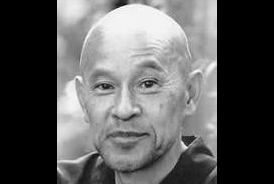by Ken Russell: Certain books are so outstanding that I find it hard to even begin to approach them. Zen Mind, Beginner’s Mind is one of them. This is truly a gem, the only book by Shunryu Suzuki Roshi, a contemporary Zen master, that was published before he died in 1971.
 I remember buying the book when it came out in 1970; significantly, this was during my impoverished dropout days, and the book was in hardcover. That original copy is long since gone, along with scores of other copies I have passed on to friends and students.
I remember buying the book when it came out in 1970; significantly, this was during my impoverished dropout days, and the book was in hardcover. That original copy is long since gone, along with scores of other copies I have passed on to friends and students.
I never tire of this book, although there have been long periods when I did not look at it. Every time I return to it, it reflects my own growth while highlighting areas for further exploration.
Suzuki Roshi knows of what he speaks; there is a quiet power in his words, the fragrance of a realized being. Yet he perplexes more than he elucidates. His way is not that of a philosopher with a theory to propound but that of a Zen master whose statements are to provoke or stimulate you into growth. To understand him, you must get a sense of things from his perspective. You cannot begin to appreciate his sense of life without a shift in your own understanding. And this is the beauty of it. It both reflects and stimulates growth. It is a provocation and a guidepost.
A Zen master teaches not to the mind but to the being. Many are the stories of the paradoxical behavior of Zen masters. But they are not bizarre for the sake of being different; they try to shock you into a different awareness, and Suzuki has a most gentle way of doing this. Again and again he brings us back to the paradoxical nature of life. For instance, he quotes Dogen, who said, “A flower falls, even though we love it; a weed grows, even though we do not love it.”
He relates the Zen story of the four kinds of horses-from the best to the worst-and notes that “almost all of us want to be the best horse.” Yet he goes on to say, “if you practice Zen in the right way it does not matter whether you are the best horse or the worst one.” And while this can be reassuring for those of us who have struggled with meditation practice and often feel like the worst horses, this is also somewhat of a surprise to us. Anticipating our reaction, he points out, “in your very imperfections you will find the basis for your firm, way-seeking mind.”
And it has indeed been my observation that many students who struggle against serious personal problems benefit most on the spiritual path. Perhaps it is the very difficulty of their lives that has prodded them into deeper movement. Few people who have led lives with little personal difficulty or internal conflict are ever motivated to explore the vastness of being, and so they remain stuck, ignorant of the fullness of life.
A favorite line of mine-one that has helped me weather many a crisis-is his question: “When you are sitting in the middle of your problem, which is more real to you: your problem or you yourself ?” I have found the contemplation of this one question alone to be extremely revealing and growth provoking.
Some of Suzuki’s statements seem beyond our grasp. He says “reality cannot be caught by thinking or feeling mind.” How will we catch reality if we can’t do it by thinking or feeling? What other modes do human beings have available to them? This is another statement, another Zen puzzle, that can be usefully explored.
Suzuki Roshi knows our “inmost nature wants some medium, some way to express and realize itself.” But since this cannot be either thinking or feeling, we are left wondering what it is. He points not to intellectual or emotional ways but to a very simple practice: sitting meditation and awareness of what we are doing from moment to moment. Again and again he brings home the necessity for the simple practice of sitting and watching, just sitting and watching, attending to the present moment. Not trying to change our lives, but simply watching our lives.
Suzuki Roshi does not lay down an idealistic trip. He does not preach to us. He is very practical. He understands human nature, our tendency to be distracted from our way: “we cannot stay still; we have to do something. So if you do something, you should be very observant, and careful, and alert.” But he cautions against making this special, being caught up in some esoteric fascination. “Zen is not some kind of excitement but concentration on our usual everyday routine.”
One of Suzuki Roshi’s endearing qualities is the way he couches the most profound concepts in simple terms. He likens the process that Prince Gautama went through in becoming the Buddha to the baking of bread: “Our way is to put the dough in the oven and watch it carefully.” The way we come to understand our consciousness (as the Buddha understood his) is by baking our lives over and over again until we understand exactly what happens.
He uses images and experiences from his own life to convey his understandings. About a waterfall he saw in Yosemite National Park, he says: “The highest one there is 1,340 feet high, and from it the water comes down like a curtain thrown from the top of the mountain. It does not come down swiftly, as you might expect; it seems to come down very slowly because of the distance. And the water does not come down as one stream, but is separated into many tiny streams. . . . And I thought it must be a very difficult experience for each drop of water to come down from the top of such a high mountain. It takes time, you know, a long time, for the water finally to reach the bottom of the waterfall. And it seems to me that our human life may be like this.”
Many students on the spiritual path get caught up in conflict about how they should act on their way down the waterfall. They have been told that spirituality means being selfless. But this confuses the end with the means to attaining it. Suzuki Roshi puts it clearly: “You must be true to your own way until at last you actually come to the point where you see it is necessary to forget all about yourself.” In other words, being selfless is not a command we lay on ourselves but the outcome of following our way to the end where we realize that, in fact, there is no need to be preoccupied with ourselves. This comes out of our experience and is real rather than practiced and thus artificial. Gautama attained selflessness with his realization, not as a precondition to its attainment.
Suzuki Roshi does not propagate or encourage any dogma or belief. He reflects the true essence of Zen-an enquiry into our personal reality. He notes that “the purpose of practice . . . is to study ourselves.” And what is the way of studying ourselves? “Instead of having some object of worship, we just concentrate on the activity we do in each moment.” This is the no-nonsense Zen approach to understanding truth. What could be simpler than “What is true zazen? When you become you!”
No matter how profound Suzuki Roshi’s understanding is, you are the one who will determine the impact of the book on your life. So that his words do not add to the clutter in your mind, you need to put your understandings into practice. When a particular section in his book strikes you, find a way to apply it to your life. This very effort is what Zen is, for Zen is your life, not something apart from yourself or something you might do to be spiritual. Working with your own life is Zen.









































